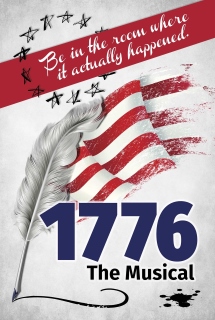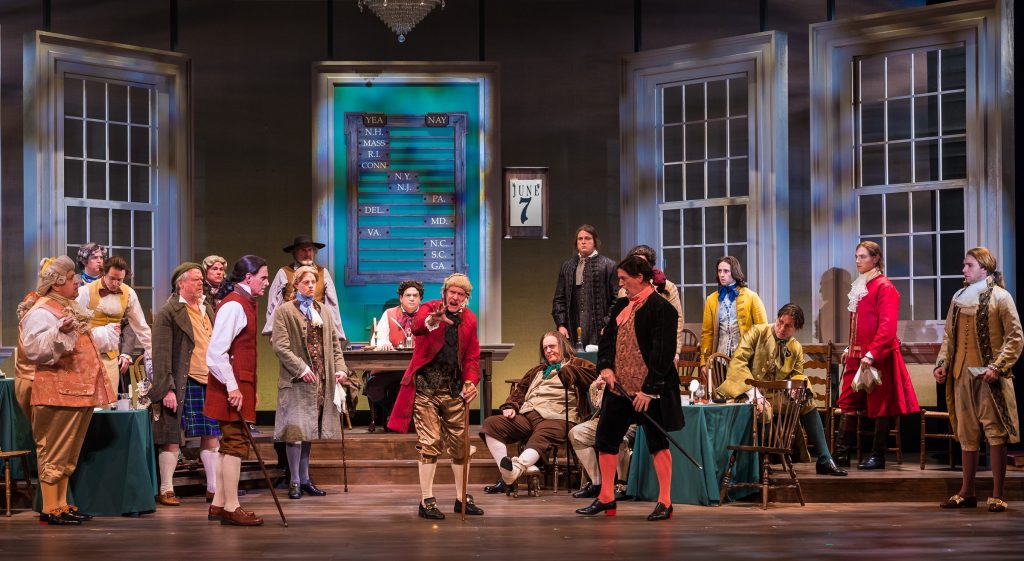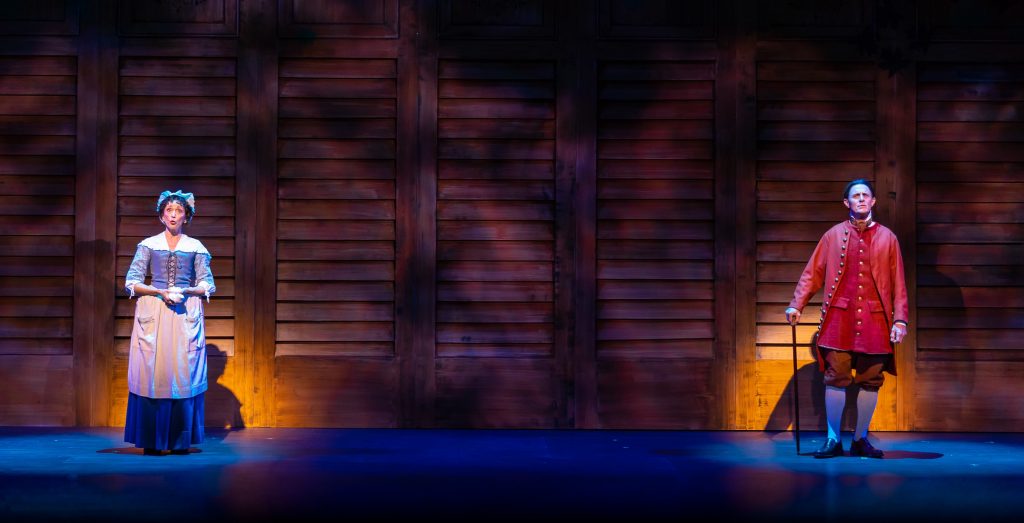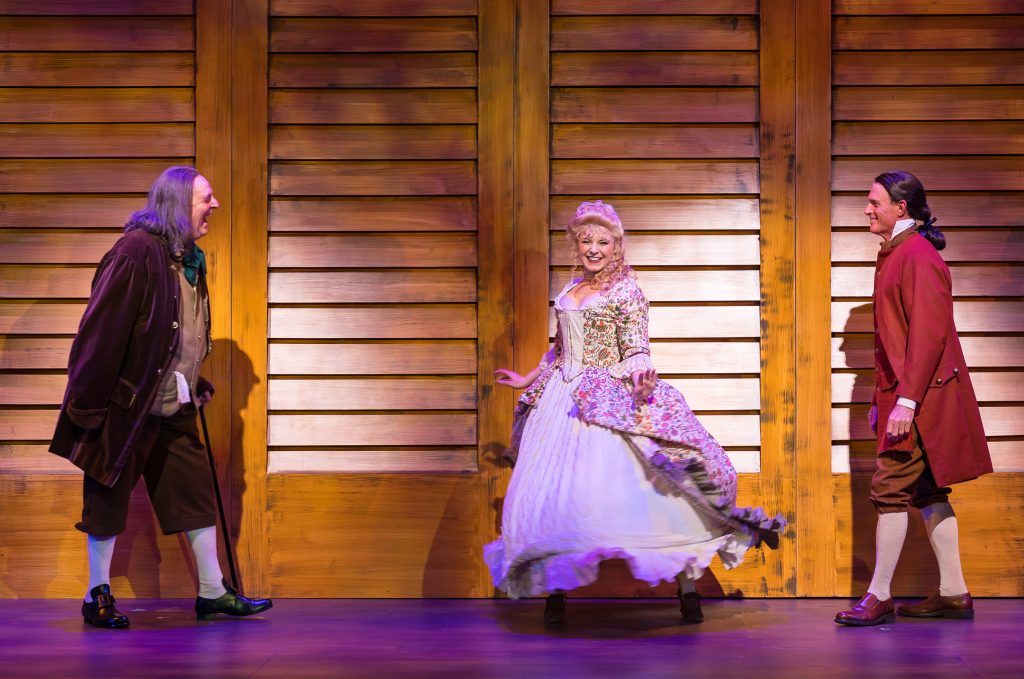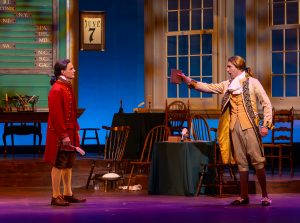YOU SAY YOU WANT A REVOLUTION?
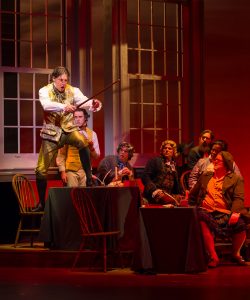 How remarkable to have been a fly on the wall when the creators of 1776, the 1969 musical receiving a terrific La Mirada Theatre/McCoy Rigby revival, were deciding the 11 o’clock number (the trope given for the big, late in the second act number by a self-realizing main character that also energizes the audience). For, up to this point, 1776 is about John Adams’ tireless crusade to enroll the Continental Congress to vote for independence from England. You would think the song would be something like “The Spirit of ’76!” sung by John Adams. Instead, a South Carolina Congressman goes berserk (with African rhythms no less) during his tirade about the North’s economic complicity in the Slave Trade. Any producer in his right mind would have given up at the reading and taken the million dollar loss.
How remarkable to have been a fly on the wall when the creators of 1776, the 1969 musical receiving a terrific La Mirada Theatre/McCoy Rigby revival, were deciding the 11 o’clock number (the trope given for the big, late in the second act number by a self-realizing main character that also energizes the audience). For, up to this point, 1776 is about John Adams’ tireless crusade to enroll the Continental Congress to vote for independence from England. You would think the song would be something like “The Spirit of ’76!” sung by John Adams. Instead, a South Carolina Congressman goes berserk (with African rhythms no less) during his tirade about the North’s economic complicity in the Slave Trade. Any producer in his right mind would have given up at the reading and taken the million dollar loss.
But that is only one of the miracles of this revolutionary musical. Peter Stone created some of the wittiest, most sophisticated dialogue in musical theater history, and, as conceptualized by composer and lyricist Sherman Edwards, one of the most compelling stories ever seen in the book of a musical. Stone wisely believed that Adams and the others were not to be treated as Gods in his script; instead, they should have an affectionate familiarity to the audience, nothing reverential. And director Glenn Casale and his Broadway-caliber cast offer a gripping evening, giving you more bang for your buck than fireworks on the fourth of July. The first act, which clocks in at one hour forty-five minutes, flies by like a steady, soaring eagle. (Another miracle is that Scene III of this act holds the record for the longest time in a musical without a single note of music.)
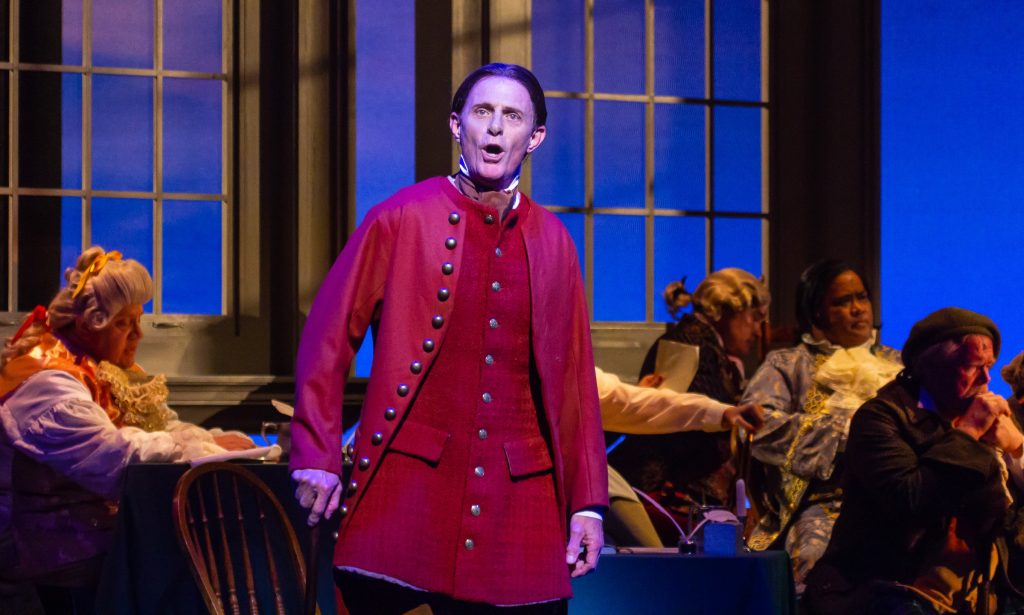 1776 is wisely more folklore than truth: for example, Stone includes a collection of bon mots from Benjamin Franklin’s entire career which are conveniently inserted into the action — as are the many letters between John and Abigail Adams. The truth is that both the debates and signing of the Declaration were a slipshod affair (historians can only surmise the date of the signing, but it surely was not July 4) and too much fidelity to the truth — especially the timeline of events — would have made for poor storytelling (56 signatories have been whittled down to 19 here). Stone and Edwards were revered with a Tony Award for Best Musical, beating out Hair, the rock musical that surely was the zeitgeist of the times, but in hindsight not nearly as timeless as this soul-stirring and rousing affair.
1776 is wisely more folklore than truth: for example, Stone includes a collection of bon mots from Benjamin Franklin’s entire career which are conveniently inserted into the action — as are the many letters between John and Abigail Adams. The truth is that both the debates and signing of the Declaration were a slipshod affair (historians can only surmise the date of the signing, but it surely was not July 4) and too much fidelity to the truth — especially the timeline of events — would have made for poor storytelling (56 signatories have been whittled down to 19 here). Stone and Edwards were revered with a Tony Award for Best Musical, beating out Hair, the rock musical that surely was the zeitgeist of the times, but in hindsight not nearly as timeless as this soul-stirring and rousing affair.
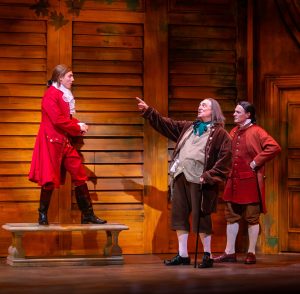 The “obnoxious and disliked” John Adams (the likable and stirring Andy Umberger) and Ben Franklin (in a non-literal yet endearing portrayal by Peter Van Norden) are having trouble getting a discussion on Independence off the ground, so they coerce Richard Henry Lee (a high-flyin’ Michael Starr) to propose a vote on independence from Britain. Later, when a proposal to suspend discussion on independence is narrowly defeated, it leads to a walking-stick fight between Adams and Philadelphia’s John Dickinson (Michael Stone Forrest, played with cool and stately provocation). A committee to write a declaration of independence is created and must deliver the document three weeks hence. Thomas Jefferson (Caleb Shaw) is selected by default in the delightful number, “But, Mr. Adams.”
The “obnoxious and disliked” John Adams (the likable and stirring Andy Umberger) and Ben Franklin (in a non-literal yet endearing portrayal by Peter Van Norden) are having trouble getting a discussion on Independence off the ground, so they coerce Richard Henry Lee (a high-flyin’ Michael Starr) to propose a vote on independence from Britain. Later, when a proposal to suspend discussion on independence is narrowly defeated, it leads to a walking-stick fight between Adams and Philadelphia’s John Dickinson (Michael Stone Forrest, played with cool and stately provocation). A committee to write a declaration of independence is created and must deliver the document three weeks hence. Thomas Jefferson (Caleb Shaw) is selected by default in the delightful number, “But, Mr. Adams.”
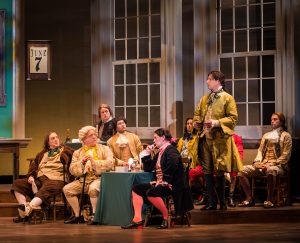 Glorious moments of this production are multitudinous, but even though we all know how it turns out in the end, it’s a true nail-biter. Along the way, the luminous Teri Bibb plays Abigail Adams, whose only interaction with the cast is via the famous letters between her and Mr. Adams; the plaintive Michael Kean plays a battle-scarred courier in the affecting ballad, “Momma, Look Sharp”; Peter Allen Vogt does a dashingly effete take on Samuel Chase of Maryland; Nick Santa Maria has some delightful double-takes as John Hancock (although his fly-swatter needs much more weight for comic relief); and charming Ellie Wyman entrances as Martha Jefferson, who was drawn to her husband because “He Plays the Violin.” But it is James Barbour as Edward Rutledge, the aforementioned South Carolinian, whose performance of “Molasses to Rum” is so powerful that it could re-crack the Liberty Bell.
Glorious moments of this production are multitudinous, but even though we all know how it turns out in the end, it’s a true nail-biter. Along the way, the luminous Teri Bibb plays Abigail Adams, whose only interaction with the cast is via the famous letters between her and Mr. Adams; the plaintive Michael Kean plays a battle-scarred courier in the affecting ballad, “Momma, Look Sharp”; Peter Allen Vogt does a dashingly effete take on Samuel Chase of Maryland; Nick Santa Maria has some delightful double-takes as John Hancock (although his fly-swatter needs much more weight for comic relief); and charming Ellie Wyman entrances as Martha Jefferson, who was drawn to her husband because “He Plays the Violin.” But it is James Barbour as Edward Rutledge, the aforementioned South Carolinian, whose performance of “Molasses to Rum” is so powerful that it could re-crack the Liberty Bell.
The design elements are a bit clumsy, with EB Bohks’ wigs being the biggest offender — the courier looks strangely more like a zombie than a boy with PTSD. Many of Shon LeBlanc’s costumes are strangely ill-fitting, which I want to say was not the custom for colonialistic tailoring. Stephen Gifford’s set design allows players to walk through walls and up steps to a platform, and playing areas are strangely unwieldy. Because the set is non-representational, there aren’t a lot of props, but Kevin Williams’s wall-calendar dates are wooden, and when pulled off by the custodian (a riotous Michael Rothaar) they fall clumsily to the floor.
Even so, 1776 remains highly recommended, especially to those parched individuals who need to be slaked from America’s current dearth of inspiration. If you are feeling downtrodden about our current political climate (and who isn’t?), bolt for the La Mirada Theatre and see why Vietnam-era audiences lapped up 1776: you will find that remarkably little has changed in politics (we were in the midst of another government shutdown when 1776 played A.C.T. in S.F. in 2013). The difference back then was that the colonials put their lives on the dotted line, got something done, and changed history in the process.
photos by Jason Niedle
1776
La Mirada Theatre for the Performing Arts
14900 La Mirada Blvd. in La Mirada
Wed & Thurs at 7:30; Fri at 8; Sat at 2 & 8; Sun at 2
ends on February 3, 2019
for tickets, call 562.944.9801 or visit La Mirada Theatre
then plays The Soraya at Cal State, Northridge, February 8-10, 2019
for tickets, call 818.677.3000 or visit The Soraya
